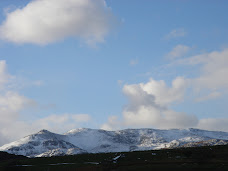Hi Dad,
Thanks for this. I've read the exchange between you and Colin and would like to add my input when I get time.
The statement that there is "no clear relationship between atmospheric CO2 concentration and air temperature" contradicts everything I have studied and is basic scientific fact dating back to the 1900 or before.
"However there is no clear relationship between atmospheric CO2 concentration and air temperature. For most of the last billion years, CO2 concentrations have been in the thousands of parts per million, sometimes tens of thousands, yet the Earth's temperature has fluctuated within a fairly narrow range and has not run away. The Earth is a remarkably self-regulating body. The present concentration of 400+ppm is much lower than the average during the past millions of years. Of course the concentrations were a little lower during the so-called pre-industrial period, at around 260-290ppm.
So if the concentrations were lower in the pre-industrial era how do you account for the Early Interglacial Warm Period about 10,000 years ago, the warm periods during the Egyptian Old Kingdom, and the Roman Warm Period, when the temperatures were higher than today and for the Mediaeval Warm Period when it was at least as warm? They have to be natural fluctuations. Also, there is quite strong evidence that atmospheric temperature rises precede, not follow, CO2 rises, as shown for example by analysis of air trapped in Antarctic ice cores going back 650,000 years or more. (my emphasis) At the end of the last five glacial periods it appears that the rise in CO2 laggged behind temperature by an average of 600-1000 years."
Yes the Earth has been a remarkably self-regulating body... until now. The Earth was a completely different planet millions of years ago when atmospheric CO2 concentrations were of a similar level to now. For example, there was no Antarctic ice sheet and sea level was hundreds of meters higher. The most appropriate reference period historically is the last 2 million years - the Quarternary period. During these 2 million years, Earth shifted from glacial and interglacial periods numerous times as a result of Milanovich Cycles (subtle and regular changes in the Earth's orbit). Other natural events (such as volcanic eruptions and sun spots) also contributed to relatively short periods of changes in Earth's temperature. Furthermore, the last 10,000 years has been the relatively warm and stable Holocene period, whereby humans have benefited from very stable atmospheric conditions while technically still being in an "ice age" (because we still have ice at the poles, for now). Based on Milankovitch Cycles only, we should be going back into a cooler period. The reality is that the opposite is true as a result of human activity, hence many scientists are now saying we are in the Anthropocene - literally a new Geological Era.
The climatic and environmental changes evidence in paleo records during the Quaternary Period demonstrates a very sensitive and responsive Earth system to natural forcings. For example, for all the talk of atmospheric changes, oceanic changes seem to be overlooked and yet have often had a much more significant role in Earth system regulation. Given that planet Earth has quite literally never experienced the rate of emissions from human activity over the last 150 years, we are in unchartered territory and playing a very dangerous game with our home planet. In summary, Earth went through huge climatic and environmental shifts following much smaller changes in CO2 concentrations that we are currently witnessing!
Regarding Colin's opinions about the IPCC reporting process - yes, the final report has needed to be signed off by politicians and has had numerous edits; however, this has historically resulted in a watering down of the science and over cautious message in order to reach consensus, NOT an over alarmist message. It is only the last couple IPCC reports that the science has become so overwhelming and the stakes so high, that the true state of the planet and our future is laid bare.
I wonder with all his knowledge, has Colin actually read any of the most recent IPCC report(s)? I would be interested to know if Colin has considered the 9 tipping points. One or two of which we have probably already passed (e.g. the collapse of the West Antarctic Ice Sheet is now almost certainly inevitable). The release of methane in the Arctic as permafrost melts is also very alarming, among others.
As a disclaimer, I've written the above all very quickly and from memory of my studies for MSc Polar & Alpine Change from 2012. I revised some of my knowledge a couple years ago after reading the summary of the most recent IPCC report relating to the state of the Cryosphere (referring to the various forms of ice on Earth) and keeping up to date with the headline scientific research in the area
















No comments:
Post a Comment